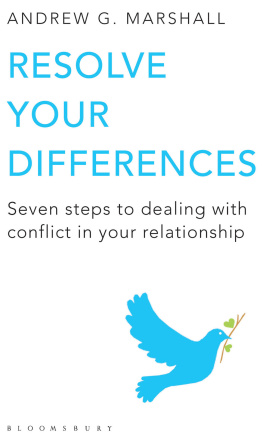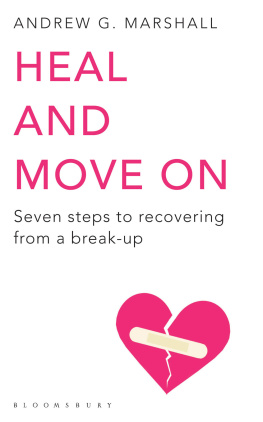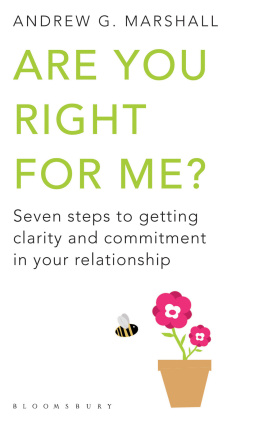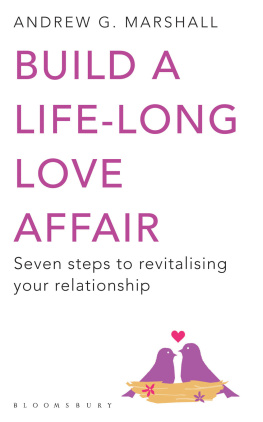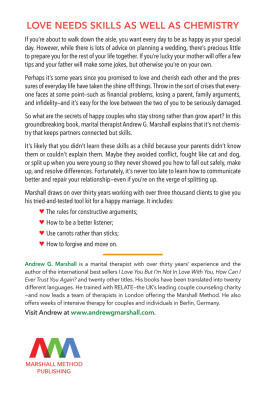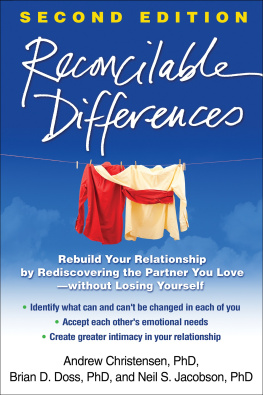Andrew G. Marshall is a marital therapist and the author of I Love You But Im Not In Love With You: Seven Steps to Saving Your Relationship , The Single Trap: The Two-step Guide to Escaping It and Finding Lasting Love and How Can I Ever Trust You Again?: Infidelity: From Discovery to Recovery in Seven Steps . He writes for The Times , the Mail on Sunday , the Guardian , Psychologies and womens magazines around the world. His work has been translated into over fifteen languages. Andrew trained with Relate and has a private practice offering counselling, workshops, training days and inspirational talks.
www.andrewgmarshall.com
1. Taking Stock
The higher the stakes, the more feelings run high, the more crucial the conversation. Unfortunately, these are the very discussions that we are likely to handle badly.
- When partners want different things, they often adopt one of four negative approaches. These include trying to control their partner, rebelling, indifference (persuading oneself something is not important) and compliance (rolling over and letting the other person have their way).
- Although all these approaches work in the short term, they can store up problems for the future.
- There is a positive alternative: cooperation (finding a solution that is acceptable to both partners).
- This goal is helped by adopting three helpful philosophies about relationships: problems are six of one and half a dozen of the other; emotional equals attract, and the eighty/twenty rule (recurring problems are 80 per cent about the past, and 20 per cent about today).
Checkpoint: Start by taking stock of the quality of your comings and goings. What happens when you leave and return home? Do you kiss your partner goodbye or shout as you rush out of the door? When you return, do you talk about your day? How do you greet each other? Are your good intentions derailed by children, preparing a meal, the TV or checking emails? How could you improve?
2. Low-Conflict Relationships
This is where everything is a small problem so small it doesnt merit discussion.
- Although you seldom fight, there is tension and it feels like you are walking on eggshells or swallowing your discontent.
- Problems rarely get better of their own accord, so hoping for the best is seldom a good strategy.
- With little hope of anything changing, your partner may simply switch off. In the meantime, you imagine everything is fine because your partner has stopped complaining. However, things are only better on the surface.
- Start with small issues and work up to the bigger ones.
Checkpoint: Improve your communication by taking it in turns to talk. Toss a coin and the winner has five minutes to explain all his or her concerns. The other person will listen without interruption and afterwards will summarise what he or she heard nothing more. No interpreting or giving the other side just repeating back the main points. Afterwards, swap over so both of you have a chance to talk for five minutes and to summarise the others case.
3. High-conflict Relationships
Either both partners reaction to a problem is to fight or one fights and the other flees. The first reaction escalates even the smallest issue to something big. The second provides pursuit and withdrawal, or withdrawal with the other partner in hot pursuit.
- Anger is not something that you should express whenever or wherever you want to.
- Having said that, it is not something to suppress either.
- Listen to the message of the anger, understand why you feel so strongly and let it out in a controlled manner rather than a hot blast or an icy withdrawal.
- Make certain that you are angry with the right person to the right degree.
- Be wary of exaggerating your feelings to make a point.
- By allowing yourself to get too angry, you could inadvertently train yourself to get angrier the next time so that the madder you feel, the madder you get.
Checkpoint: If you are about to let rip, stop and think: will this negative statement only make matters worse? It is always better to praise what was done rather than criticise what was not. With recurring problems, choose a time when you are not angry so that you can discuss the issue and look for a solution rather than just let off steam.
4. Develop Your Assertiveness
This is when communication is open, because you expect to get a hearing, and honest, because there is no editing of feelings for fear of upsetting anyone.
- Think about what your partner wants.
- How strong are his or her feelings?
- What do you personally hope to gain?
- How strong are your feelings?
- Look at the options and instead of having a winner and loser, attempt to find a solution where both of you are winners.
- Being assertive, rather than aggressive, will encourage your partner to respond in a similar manner.
Checkpoint: Assertiveness training has its roots in the workplace. It is easier to start using the skills in this environment or when dealing with shop assistants or tradespeople because the stakes are lower than with our partner. Once you feel confident, you can transfer the skills to the home.
5. How to Argue Effectively
Arguing is a skill and skills can be taught and, with a little practice, perfected.
- Tackle one subject at a time.
- Bring up issues as soon as possible rather than save up for a deluge.
- Really listen to your partners case and imagine, if for only five minutes, that he or she is right. After all, this is someone that you love and must, therefore, have some valid points.
- Aim for a compromise.
Checkpoint: Concentrate on your partners behaviour: Please dont leave wet towels on the bed rather than criticising his or her personality. For example, Youre slovenly.
6. Saving the Situation
With complex and long-running problems, it is helpful to have good arguing skills but even more important to be a good listener.
- Never dismiss a possible solution even if at first sight it seems ridiculous because talking it through together will probably suggest a better, more workable solution.
- Although we imagine, for ingrained issues, that nothing we say or do will impact on our partner, this is often because we have tried the same failed strategy again and again or, worse still, in a more and more extreme form.
- Instead of waiting for your partner to change, take the initiative yourself.
- Sometimes, accepting the full horror of your situation, rather than trying to ignore it or play down the severity, and acknowledging the problems ahead, is the first step towards healing.
Checkpoint: When faced with a fresh incident in a long-term problem, the temptation is to react automatically and have some variation of the same old argument. Break out of the rut by doing something completely different. If you rant and rave, try being detached and icy calm. If you walk away, stay and talk. In many cases, the opposite approach can provide a breakthrough.
7. Moving On
It is not always possible to find a solution. Sometimes it is enough to agree to differ. However, it is impossible to move on before:
- Both partners have had a chance to fully express their feelings.
- Both partners feel they have been properly heard.
- All the options have been explored.
- Each partner has challenged their own expectations.
- You have done a post-mortem and learned from any argument.
Checkpoint: Show your internal workings and ask for help from your partner, rather than unilaterally coming up with a solution. If your partner is involved in the decision process, he or she will not only understand but also have a stake in the outcome.
Final Nutshell:
- Improving your communication is the surest way to improve your relationship.
Next page
